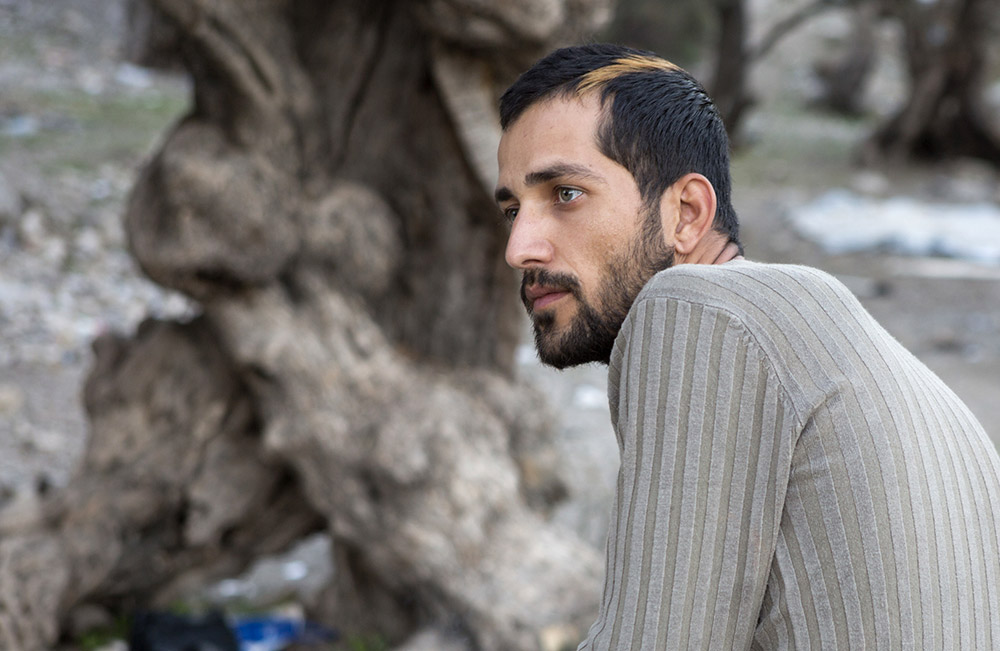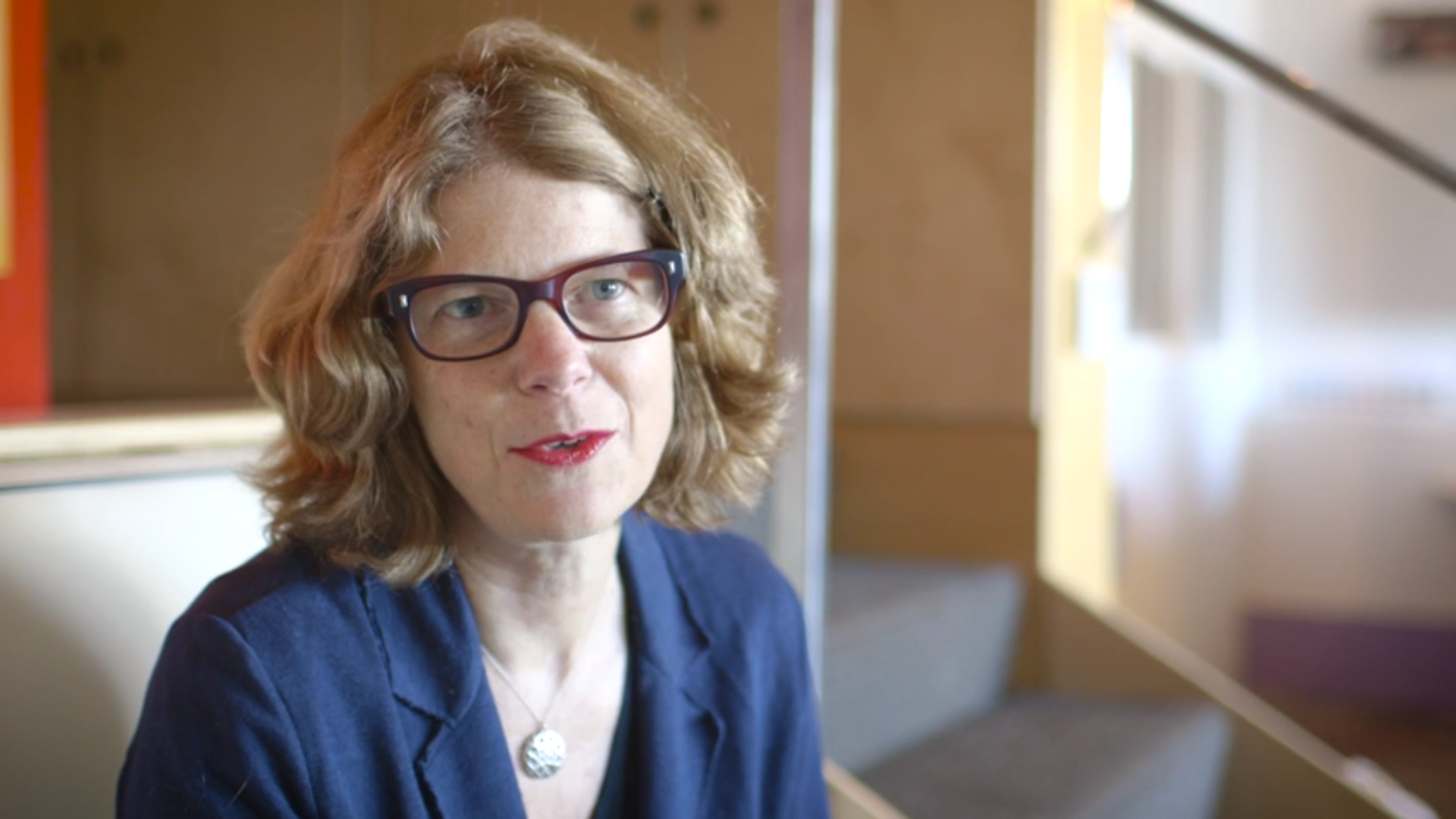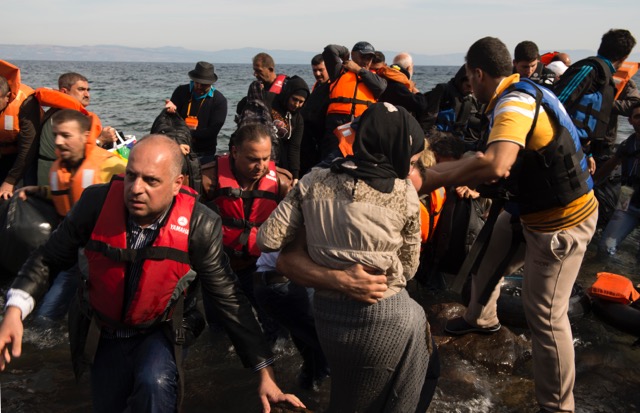
I MET SIMA FARAUATE, 27, at the entrance to Kara Tepe refugee camp on the Greek island of Lesbos a few days after the terrorist attacks in Paris killed 130 people and unleashed an anti-immigrant backlash across Europe. She and her husband, Amaas, had just survived the dangerous sea crossing from Turkey operated by smugglers that has been the main route for refugees and migrants seeking safe haven from ISIS in Europe. For around $1,000 each, they had been transported to the coast by bus from Izmir, Turkey, kept hidden in an olive grove overnight, then jammed into a rubber dinghy with 45 other refugees. Once their boat reached Lesbos, they walked to a reception center along the coast and then a bus transported them 45 kilometers over the steep terrain of northern Lesbos to the camp near the capital city of Mytilene. "I'm so tired," Sima said. "So tired."
I could imagine that she was, and not only because of the boat trip. The young couple was from Aleppo, which has been devastated by the ongoing war in Syria. Sima told me they couldn't survive there any longer. "It was impossible." So they walked three days from their home to cross the border into Turkey. "We walk all the time. This is our life now."
They had already completed their registration and purchased tickets for the ferry to Athens departing later that night. Under the supervision of the Greek police, with support from Europe's border agency, Frontex, and other European authorities, refugees arriving in Greece undergo interviews, are photographed, and have their fingerprints scanned into a database. Since Sima and her husband were Syrian, the process was expedited. Afghans, Iraqis, Pakistanis, and other nationalities considered to have weaker asylum claims must register at another camp, with worse facilities, where it can take a week to obtain documents. President Francois Hollande of France is calling for increased security at Europe's outer border; in the current system, new registrants can't be tracked precisely as they move from entry points such as Lesbos into different European countries.
From Athens, the couple was headed to Germany — a country Sima said she knew was "very different from Syria." I wondered if she was afraid they might face difficulties, especially since it had been discovered that one of the Paris terrorists might have entered Europe through Greece posing as a refugee with a fake Syrian passport. "We just need peace inside and outside," she said, shaking her head. "We don't have peace in anything."
Although the signs were already clear, after the Paris bombings, that refugees would be facing more closed borders in the Balkans and greater barriers to obtaining asylum in Germany, Sweden, and other desirable countries once they managed to get there, for the Syrian refugees arriving in Lesbos just after the attacks, Paris was far from uppermost on their minds. Some were too shocked and devastated from what they had personally endured; others simply considered the attacks to be the same kind of senseless violence they were fleeing. Mostly, the refugees I talked to were very focused on survival and their desire to find "peace and security," for themselves and their families.
Asthma Mahamed, 18, was so vibrant I forgot for a moment that we were talking in a refugee camp and that she and her family had just made the harrowing crossing from Turkey. She told me her brother had already been living in a small city outside of Hamburg for two years. She was eager to join him and study to become a designer, "my passion." Her cousin Hajer, who was also traveling with Asthma and her mother and father, is engaged to her brother and hasn't seen him in two years. Ibrahim, the father, owned an auto sales and rental business in Syria, and hoped to work in the same line in Germany.
When I commented that they were a beautiful family, Asthma said, "I wish you could have seen my mother before the war. She looked like my sister." Her mother, Samar, smiled at the compliment, but looked sad. "She's aged at least 10 years," Asthma said. Although their house in Homs is still standing, many of their neighbors' houses have been bombed, and Samar has been deeply worried about the welfare of her family. "At least I can take my daughter and niece to safety. But I can't sleep thinking about my oldest daughter. She's still in Syria."
When I asked Asthma if she was concerned about border closings and rising Islamophobia in Europe since the Paris attacks, she shrugged. "Syrian people aren't afraid of anything like that. The big danger is living in Syria. After that we have no problems." Her mother added that all they wanted was to return to a peaceful Syria. "Hajer and I will study to build a new Syria," Asthma said, looking over at her cousin, who is also 18. "Inshallah. God willing."
Also in Kara Tepe camp I met Mohab Alshocough, 25, who had the expressive face and body of an actor, which is what he was back in Damascus, before a number of bombs struck his theater. "Two of my friends, also actors, were killed," he said. "There are so many things I don't want to remember."
Unlike Sima and her husband and the Mahamed family, who were passing through Lesbos for just a day or two, Mohab had been on the island for two weeks. He said he paid smugglers $4,000 just to get out of Syria. Then the dinghy he was on from Turkey flooded at sea and he lost all his belongings, including his money. He said he only needed 250 euros to move on. His parents are still in Syria but it's complicated for Syrians to wire money to Europe, and his wife, who was already in Germany, didn't have a way to send money either. So for now he's stuck.
Mohab drew me a map of his neighborhood in Damascus and put an "X" where the police station is and another "X" nearby for his house. "Missiles come in, they fire back. We're in between." He was laughing out of disbelief as he described what his life had become.
As for the terrorists who attacked Paris, "they're inhuman," Mohab said. "And they understand nothing about Islam." He left Syria to escape the war and to escape being recruited into Assad's army. "I'm an actor. I love life. I love theater. I love music. I don't want to kill anybody."
Earlier that day in the reception center known as Oxy on the northern coast of Lesbos where many refugee boats arrive, a couple hundred refugees waited in line to get water and tickets for buses that would take them on to Mytilene for registration. There were Syrians, Afghans, Iraqis, Iranians, and a smattering of mostly young men from Sudan and Morocco.
In the last year, almost 400,000 refugees have passed through Lesbos, more than half the 700,000 total for Greece. The office of the U.N. High Commissioner for Refugees reported that 44,000 had arrived in the first half of November alone. But after the Paris attacks the numbers dropped drastically, and now that Turkey seems to be cracking down on the smugglers who have operated freely on the Turkish coast across from Lesbos for many months, arrivals have slowed. The line of refugees at Oxy would soon be heading north into the Balkans where border closures and regulations were shifting every day. For now, Syrians, Afghans, and Iraqis are being allowed through. But Macedonia is denying entry to all other nationalities, causing chaos on the border with Greece and fear that many refugees will be trapped in the country, which is struggling with its own economic crisis. Even for those who do make it to Germany, Angela Merkel's "open door" policy for Syrians, Iraqis, and Afghans is under attack; the welcome mat has already been yanked for most Afghans.
But this was a beautiful, windless November day on the Aegean, and a big Iraqi man suddenly gave me a big hug while pointing to his wife and two daughters with a huge smile, saying, "Thank you, thank you." Reaching the shores of Lesbos is a moment of optimism for many. Not only have they survived the terrifying sea crossing, they are on European soil. I didn't know where the family was headed, but they were happy for now.
Then I saw a young man in line with his high tops dangling around his neck looking very distraught. An Afghan man who came on the boat with him spoke some Arabic and told me that the young man was traveling by himself. I asked about his family and he said they were all killed when a bomb struck their house in Aleppo four months ago. He had no idea where he was going to go in Europe and had no money. "I know he's having big problems," the Afghan man told me. "He's very alone."
"They blame all the Muslims," he continued. "For us this is nothing new." We were sitting in the fishing village of Skala Sykaminia about 20 kilometers south of Oxy. Aslam arrived in Lesbos as a refugee from Syria on September 20 and then decided to stay and work as a volunteer to help new arrivals. Most of his family had already left Damascus, where he was an aid worker for the Red Cross and other humanitarian groups. His mother lives in Dubai and his four sisters are in Qatar, Germany, and the United States.
"We are very sorry for the 130 people who died in Paris," Aslam told me. "We need better security to catch the extremists. But closing the borders will just mean that more people will die in other countries."
Aslam's main concern wasn't his fellow Syrians, but the Afghan man and other non-Syrian refugees. "Syrians are treated like people. But the rest are treated like animals. I'm Syrian and I'm saying this. It's not fair."
Although his own family had been displaced from Syria because of the war, he didn't advocate for special treatment for Syrians. "We've had five years of a terrible war. But in Afghanistan it's been 30."
Back in Kara Tepe, I met Rania, a soft-spoken art teacher from Deir ez-Zor in eastern Syria who would be leaving for Athens and then the Balkans the next day. She invited me to sit down with her on the gray UNHCR blanket she had spread out on the ground in front of her tent. Her husband and two children were elsewhere, so we were alone. Just as Mohab had done, she took my reporter's notebook and drew a map of her hometown, Deir ez-Zor, with a small circle in the center. "We live in there," she pointed. "All around us is Daesh." Then she told me about everything she had left behind — a house, a car, so many close friends. "We had such a wonderful life."
When she described her pupils at the elementary school where she worked, how they loved her, tears came to her eyes. I felt that not one cell in her body wanted to be where she was right now. She seemed so upset I couldn't bring myself to ask her about the darkening atmosphere for Syrians in Europe and how she thought it might affect her family.
She leaned back on her backpack and let her head fall to the side and rest on one arm. I could see she was very, very tired.

Education Resource
Meet the Journalist: Jeanne Carstensen
Jeanne Carstensen reports on the refugee crisis on the Greek island of Lesbos. Much of the local...






